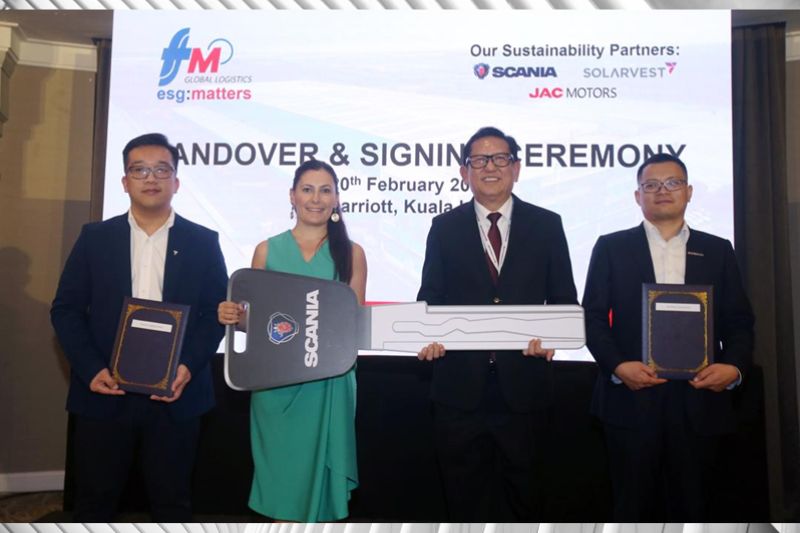FM Global Logistics Holdings Berhad (FM Group), one of Southeast Asia’s top-tier multimodal freight providers, is strengthening its commitment to environmental, social, and governance (ESG) initiatives through strategic collaborations with three strategic partners.
FM Group Strengthens ESG Commitment with Strategic Partnerships
 FM Global Logistics Holdings Berhad group managing director Chew Chong Keat (centre right) with Scania managing director of Southeast Asia Joyce Antar (centre left), Solarvest Holdings Berhad group vice president Jack Tan Qi Jie (far left), and JAC Motors Malaysia regional manager of Asia-Pacific Marketing Jason Jia (far right)
FM Global Logistics Holdings Berhad group managing director Chew Chong Keat (centre right) with Scania managing director of Southeast Asia Joyce Antar (centre left), Solarvest Holdings Berhad group vice president Jack Tan Qi Jie (far left), and JAC Motors Malaysia regional manager of Asia-Pacific Marketing Jason Jia (far right)
Through its wholly owned subsidiary, FM Global Logistics Sdn Bhd (FM), the Group is making substantial investments in sustainable technologies and energy-efficient solutions.
Its partners in this initiative include Scania Malaysia Sdn Bhd (Scania), Solarvest Energy Sdn Bhd (Solarvest), and JAC Motors Malaysia Sdn Bhd (JAC Motors)
FM has committed approximately RM11 million to acquire 20 Scania Super trucks equipped with fuel-efficient Euro 5 engines, RM1.5 million for installing solar systems in its warehouses by Solarvest, and RM557,000 for purchasing two JAC i75 electric trucks.
The agreements were formalised during a ceremony held in Kuala Lumpur, where FM Group marked the handover of the first six Scania Super trucks, presented a Letter of Award (LOA) to Solarvest, and signed an LOA with JAC Motors.
FM group managing director Chew Chong Keat emphasised the company’s commitment to sustainability, stating, “Our partnerships with Scania, Solarvest, and JAC Motors propel us closer to our greenhouse gas (GHG) reduction targets.”
“These investments in green technology not only ensure regulatory compliance but also reinforce our dedication to environmental responsibility,” he added.
Driving Fuel Efficiency and Emission Reductions
Scania’s Super trucks are expected to deliver up to 8% in fuel savings per vehicle, significantly reducing FM Group’s carbon footprint. According to Scania, these trucks could lower GHG emissions from FM’s operations by approximately 719 metric tonnes annually.
“It is a tailor-made partnership designed to maximise FM Group’s fuel efficiency while reducing carbon dioxide, nitrogen oxide, and particulate matter emissions—all in alignment with ESG requirements,” said Joyce Antar, managing director for Scania Southeast Asia, at the handover ceremony.
FM’s transition towards electric vehicles begins with the acquisition of two JAC i75 electric trucks. JAC Motors estimates that each vehicle will contribute to a reduction of up to 6 metric tonnes of GHG emissions per year.
Jason Jia, JAC Motors’ regional manager of Asia-Pacific Marketing, highlighted the trucks’ capabilities at the signing ceremony, stating, “These EV trucks leverage the latest clean energy technologies, offering a driving range of 200–250 km—ideal for urban logistics and last-mile delivery.”
Scaling Renewable Energy for Greener Operations
FM Group is also scaling its renewable energy initiatives by expanding its collaboration with Solarvest.
Following the successful installation of solar PV systems on its first warehouse last year, FM is now commissioning Solarvest to equip two additional warehouses with solar systems, bringing the company’s total installed solar capacity to nearly 1.6 megawatts peak (MWp).
The solar panels across the three warehouses are projected to generate approximately 2,000 megawatt hours (MWh) of clean energy annually, potentially offsetting around 1,300 metric tonnes of GHG emissions.
“This initiative underscores our shared vision of sustainability and commitment to advancing clean energy solutions in the logistics sector,” said Jack Tan, Solarvest Group vice president, at the LOA presentation.
Chew reaffirmed FM Group’s dedication to sustainability, stating, “These solar systems achieve two key objectives: reducing our reliance on electricity from the national grid and significantly lowering GHG emissions from purchased electricity.”
Expanding ESG Efforts Beyond Malaysia
FM Group’s latest investments reinforce its position as an industry leader in sustainability, integrating green technology into its fleet, warehousing, and operations to support an eco-friendlier logistics ecosystem.
Looking ahead, FM Group aims to extend its ESG initiatives across its regional offices, progressively reducing its carbon footprint through sustainable practices, increased energy efficiency, and greater integration of renewable energy sources.
“With this momentum, we are poised to lead the logistics sector towards a more sustainable and responsible future,” Chew concluded.

